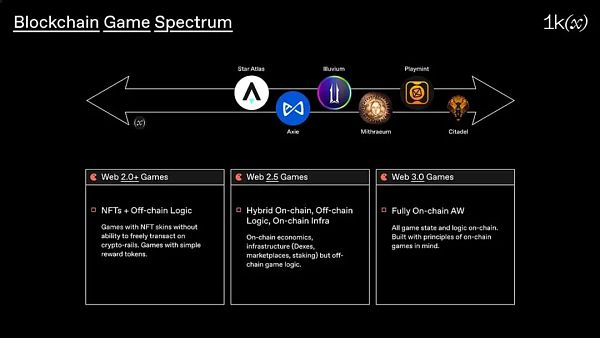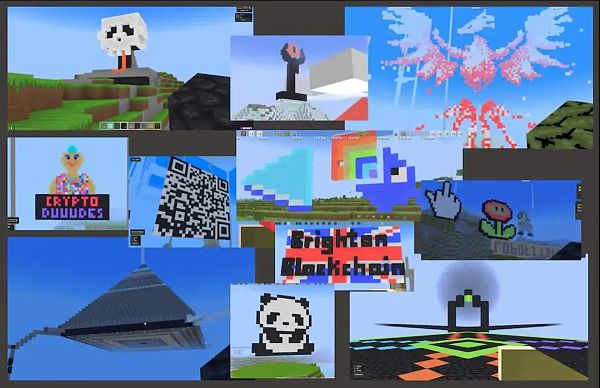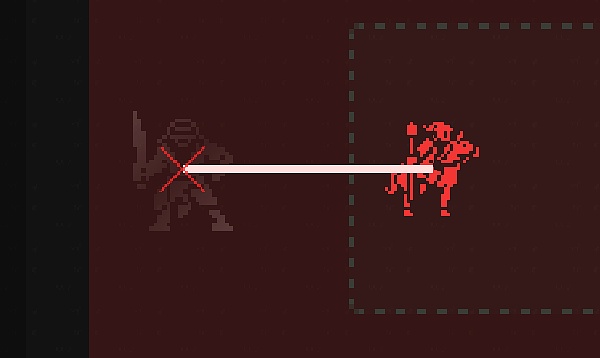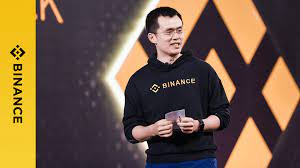Autonomous World and Full On-Chain Games
Autonomous World and On-Chain Games“On-chain” in two different senses
In the field of cryptography, “on-chain” has two different meanings. In general, it refers to using blockchain in a broader way. For example, putting music on the chain (casting your songs as NFTs on platforms like sound.xyz) is a common operation. However, please note that when you mint an NFT on Ethereum, you still store the media files or other resources of that NFT off-chain, such as on centralized servers or the InterPlanetary File System (IPFS).
Therefore, the second, older, and more technical meaning of “on-chain” refers to storing all the content of an NFT or blockchain-based project directly on the blockchain.
Although on-chain storage in this way is relatively expensive compared to off-chain alternatives, it offers considerable durability and openness, as long as the blockchain exists, on-chain projects will exist and can continue to be built upon.
- In the free Web3 world, can our transactions also travel freely?
- Understanding Cross-Chain DeFi in One Article
- Biographer of Elon Musk reveals heavyweight insider information 10 years ago, he began to worry about AI destroying humanity.
Of course, there is a spectrum as well, with some projects having a low degree of reliance on the blockchain, some using a combination of off-chain and on-chain storage, and some being fully on-chain. This spectrum also applies to blockchain gaming scenarios.

Fully on-chain gaming
So, autonomous worlds appear in the aspect of “fully on-chain” in the gaming field. In such projects, the logic and state of the game are completely on-chain, meaning their rules and progress are all completed in smart contracts, and all game data is on the blockchain, paving the way for interoperability. Therefore, autonomous worlds are independent of the client, which means anyone can create their own interface to interact with the underlying game. Let’s talk about the dream of game modders!
Why are autonomous worlds important?
Autonomous worlds can be infinite games (independent of the creator’s operation), open to anyone, and evolve over time. The game itself becomes a protocol and its own world, allowing users to build upon it accordingly.
The combination of open systems and continuous online presence in these games is a great boon for interoperability and fundamentally changes traditional games, which are closed systems controlled by their creators. In autonomous worlds, players can create their own extensions in their own ways, forming a constantly evolving bottom-up ecosystem.
In addition, games made in this fully on-chain manner can themselves become economic systems. They can have their own currencies, markets, and economic rules, creating new forms of economic organization that can coexist with traditional economies. So, these games are not just entertainment, they also represent a path to new economic and social structures in the metaverse.
Autonomous Worlds Game Engine

Source: https://lattice.xyz/blog/making-of-opcraft-LianGuairt-3-what-happened-in-two-weeks-of-OPCraft
The scene of the autonomous world is currently small, but it will grow significantly in the next ten years. Therefore, some of the most important early work currently underway is the development of “on-chain game engines”, which are frameworks for launching one’s own or building around the autonomous world. Here are several on-chain game engines that you should pay attention to:
MUD: Developed by the Lattice team, this “multi-user dungeon” framework makes it easy to create complex on-chain applications on the Ethereum network. In 2022, this framework was used to create the voxel game OPCraft on the Optimism chain.
Keystone: Developed by the Curio team, this framework is actually an Optimism-based L2 chain with a built-in game engine, specifically designed for parallel gaming activities. Curio is currently building their on-chain diplomacy game, Treaty, based on this technology stack.
Dojo: A chain-based game engine and toolchain based on StarkNet, supporting the Rust and Cairo programming languages.
Argus: Argus is a game publisher committed to developing their own on-chain game creator studio stack World Engine, which is an L2 that supports sharding so that games can be built horizontally on the network.

Summary
In the December 2022 issue of Zora Zine, writer and entrepreneur Yancey Strickler predicts that the era of on-chain has already begun, and he predicts that this period will be defined as the period when “many creative cultural outputs, shared history, and information infrastructure will be established, stored, and accessed on-chain.”
I fully agree with Strickler’s view. However, I do believe that the rise of autonomous world types is part of the flourishing development of the on-chain era. When we look back in ten years, these types of games will be obvious, but right now we are at the beginning of this field, and it’s really exciting!
We will continue to update Blocking; if you have any questions or suggestions, please contact us!
Was this article helpful?
93 out of 132 found this helpful
Related articles
- Story Protocol Self-introduction Devoting a Lifetime to Fixing the Business Model of News and Media
- Guide to opening an account for a cryptocurrency exchange in Hong Kong How to identify two types of bank accounts
- Berenberg Analyst FASB’s New Regulations Will Benefit Microstrategy Company
- With investment from a16z, how does Story Protocol build IP infrastructure for the Internet era?
- Synthetix Founder Reassessing the Feasibility of Synthetix’s Multi-Chain Vision
- Interpreting Vitalik’s Latest Paper Privacy Pools, Making Compliance No Longer at the Expense of Privacy and Decentralization
- Genesis Global Capital sues DCG and DCGI, demanding repayment of over $600 million in loans.





